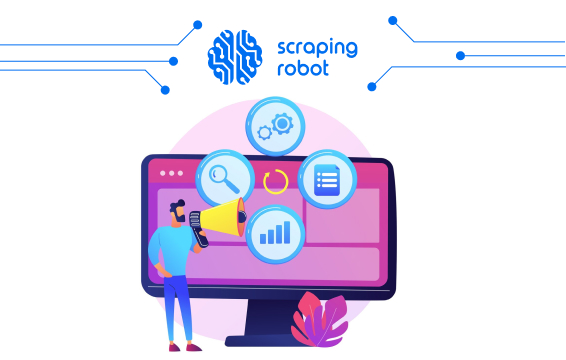Asking Great Data Analysis Questions With Web Scraping

In a sense, performing data analysis is similar to conducting a scientific experiment. You start creating questions to guide analysis (hypothesis), collect relevant data (experiment), and then analyze the results to either form new questions or discover solutions. Forming generative data analysis questions is the key to success. Without asking the right questions, you may not know what to do with the data you collect or how it’s relevant to a specific project or mission. The more specific and deep the questions, the more useful the results will be.
Use the table of contents below for tips on developing strong data analysis questions and how web scraping can ensure you get the best answers.
Table of Contents
1. How to Form Great Data Analysis Questions
2. Questions to Ask When Analyzing Data
How to Form Great Data Analysis Questions

To ensure that you are spending your data analysis time wisely, creating specific and goal-oriented questions is key to the process.
What are the organizational issues I’d like to solve?
To form good questions, you should do an overall evaluation of your organization’s well-being. If you know you are struggling with connecting on social media, then that should be a topic to form questions for instead of asking more questions about things you are succeeding at. Additionally, ask how certain issues overlap. For example, you may have many problems that stem from one larger, underlying issue. Instead of creating many questions for little problems, try to tackle many problems by addressing systemic issues within your organization.
What are the goals of data analysis?
Next, you want to theorize on the outcome that would indicate success. Continuing with a social media example, you can frame a question around the goal of gaining five thousand followers by the end of the month. With this outcome becoming part of the question, your solutions will be focused on this specific goal (5k more followers) for a specific platform instead of being overwhelmed by the generic “How do we do better with social media?”
What kinds of data are best for this project?
Finally, you want to ask yourself what kinds of datasets will best answer your questions. If you are looking to grow your social media following organically, then using sales data might not be helpful. Instead, you’ll look for data specific to gaining traction on social media and avoid spending time collecting irrelevant data.
Questions to Ask When Analyzing Data

While there are many ways to approach forming data analysis questions, here are a few topics to consider that usually yield useful results.
What data sources do we have access to?
Before collecting data, it is crucial that you and your team know how your organization accesses data and what third party systems, if any, are used to store data. Without asking this question, some people may never realize how much direct access their organization already has when it comes to data. Without asking questions regarding data sources, you may end up paying for services you don’t need or spend time collecting data you already have access to. By clearing up these questions beforehand, you can save yourself time and money by making sure you are using every tool at your disposal.
- How do we access company data?
- Do we use third-party systems to collect data? If so, which ones?
What data analysis tools do we use?
When beginning the process of analyzing data, it is important to know the history of how your organization analyzes data and how often they perform this analysis. Additionally, you should take the time to familiarize yourself with what kind of data they already use. Lots of companies focus most of their energy on financial data because it is easy to analyze, yet customer and operational data is just as important, especially when it comes to discovering ways to grow.
- What tools do you currently use to analyze data and how often do you use them?
- What kinds of data do you look at (financial, customer, operational)?
- Do we store data in one central location or keep it across various systems?
- Who is responsible for data quality?
If your organization does not ask many data questions regarding customer sentiment, they may be failing to meet the needs of customers by only focusing on questions of money. By bringing this new depth of analysis to your work, it will not only impress your team and superiors but also create more opportunities for growth.
How do we best communicate data insights?
The final process of analyzing data is communicating your results to your team. In order to present the data in a way that unites everyone, you should ask questions about how best to present the data and take into consideration how your team usually communicates.
- What communication methods do we use to share data?
- How does my team prefer to communicate/ take in new information?
- What programs are best for presenting data in this way?
- What is the goal of my presentation?
It is extra important to think about how your team learns best. If having group discussions is the most generative form of communication for your team, then bringing questions to them to discuss in an open format might be the best way to help the information stick. Similar to the first questions you should ask, you must make sure you have access to data visualization tools in order to create the most comprehensive presentation. If your team is better at taking in charts and graphs, then presenting them with these visuals first might be the best way to go.
Insights of Data Analysis Questions and Answers

While all this can seem like a lot of work, building strong data questions makes your analytics process smoother and more successful. By asking logistical, specific, goal-oriented questions, you can avoid running into problems down the road. In a sense, you are mapping out the entire analysis process by asking questions. Without taking these steps, you risk confusing yourself, your team, and wasting time and money on analysis that wasn’t helpful.
There are many benefits to forming smart analytics questions and many more questions to consider asking than covered here. Sometimes the questions themselves reveal solutions to problems before you even complete the process. For example, if you right away realize you don’t have access to company data then getting that access will be your first step of action. Overall, good data questions can give you insights that help grow your customer base, strengthen your brand, reveal ways to fix broken processes and analyze competition.
Web Scraping and Analytics Questions

Web scraping, the automatic extraction of data from web pages, is essential for answering all your data analysis questions. Not only does web scraping help automate data collection and analysis, but it helps solve fundamental questions regarding data access and collection since it performs both those tasks. Below are a few ways in which web scraping strengthens every aspect of the data analysis process.
Scrape data tips
If you are new to data collection, it can be hard to know what to do. Scraping can even help you at this stage. Using a web scraper to compare data analysis tips, programs, and more can help you parse through the sea of information that exists out there.
For organizations with entire data departments, scraping can be used to supplement the process by providing external data to support internally collected data. This way, you aren’t just relying on data generated through online sales or other automatic processes, but you are also engaging with social media data and online review data.
Create informed questions
As mentioned earlier, before you can create data questions you must understand the health of your organization as it stands. Scraping is an easy way to collect basic facts about sales, pricing, and other metrics that make it easy to spot problem areas. Scraping can also help you find data to solve deeper issues (ex. Scraping social media data, scraping product details, and scraping comments). Therefore, scraping helps you ask the right questions and find the right answers, limiting the number of different programs you have to use.
Once you discover clear problem areas, you can target your analysis towards finding solutions by asking specific questions. Without using scraping before doing the actual analysis, you may miss easy fixes and waste time and resources you could’ve spent answering deeper questions.
Custom scraping solution
When your data needs outgrow your capacity as an organization to handle them in-house, building a custom scraping solution with Scraping Robot is your next step. Custom solutions can help you scrape at higher capacity (millions or billions) while saving money (spending less per scrape). But one of the biggest perks of working with the Scraping Robot team is having their expertise guide you through building a smarter solution. With us, you’ll never have to worry about managing separate data teams or proxies. If this solution seems right for your organization, contact us and get started.
Conclusion

With so much focus on data analysis itself, it can be easy to forget how important preparation is to the process. When you take the time beforehand to create smart, thoughtful questions, then you are able to improve the entire process by analyzing only relevant data and sharing that data is the most useful way possible. Doing this work before diving into analysis helps you avoid spending all your time fixing superficial issues as opposed to systemic ones. By focusing on and fixing the right parts of your process by asking data analysis questions, you’ll be able to grow much more quickly and find success.
The information contained within this article, including information posted by official staff, guest-submitted material, message board postings, or other third-party material is presented solely for the purposes of education and furtherance of the knowledge of the reader. All trademarks used in this publication are hereby acknowledged as the property of their respective owners.
